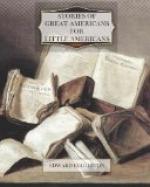Doctor Kane and his men were full of joy. They pushed their little boat into the water once more. This little boat was called the “Faith.” It had carried Kane and his men hundreds of miles in icy seas.
Once more the men took their oars, and rowed. This time they rowed with all their might. They held up the little flag that they had carried farther north than anybody had ever been before. They rowed straight to the steamer.
In the bow of the boat was a little man with a tattered red shirt. He could see that the captain of the boat was looking at him through a spy-glass.
The captain shouted to the little man, “Is that Doctor Kane?”
The little man in the red shirt shouted back, “Yes!”
Doctor Kane and his men had been gone more than two years. People had begun to think that they had all died. This steamer had been sent to find out what had become of them. When the men on the steamer heard that this little man in the red shirt was Doctor Kane himself, they sent up cheer after cheer. In a few minutes more, Doctor Kane and his men were on the steamer. They were now safe among friends. They were sailing away toward their homes.
LONGFELLOW AS A BOY.
[Illustration: Longfellow and the Bird]
Long-fel-low was a noble boy. He always wanted to do right. He could not bear to see one person do any wrong to another.
He was very tender-hearted. One day he took a gun and went shooting. He killed a robin. Then he felt sorry for the robin He came home with tears in his eyes. He was so grieved, that he never went shooting again.
He liked to read Irving’s “Sketch Book.” Its strange stories about Sleepy Hollow and Rip Van Win-kle pleased his fancy.
When he was thirteen he wrote a poem. It was about Love-well’s fight with the Indians. He sent his verses to a news-paper. He wondered if the ed-i-tor would print them. He could not think of anything else. He walked up and down in front of the printing office. He thought that his poem might be in the printer’s hands.
When the paper came out, there was his poem. It was signed “Henry.” Long-fel-low read it. He thought it a good poem.
But a judge who did not know whose poem it was talked about it that evening. He said to young Long-fel-low, “Did you see that poem in the paper? It was stiff. And all taken from other poets, too.”
This made Henry Long-fel-low feel bad. But he kept on trying. After many years, he became a famous poet.
For more than fifty years, young people have liked to read his poem called “A Psalm of Life.” Here are three stanzas of it:—
“Lives of great
men all remind us
We can make
our lives sub-lime,
And, de-part-ing, leave
behind us
Foot-prints
on the sands of time,—
“Foot-prints,
that perhaps another,
Sailing
o’er life’s solemn main,
A forlorn and ship-wrecked
brother,
Seeing,
may take heart again.




